Franklin H. Durrah (1844-1904), a private in Company F, of the 31st PA (82nd PA), wrote his letter from Philadelphia, Pennsylvania. He enlisted on August 24, 1861 and received a discharge on December 12, 1862. He sustained his injury at Fair Oaks on May 31, 1862. He composed his specimen, #95 in Series 1, on October 1, 1865.
His Series I specimen’s word count was 1256. Its readability index was 8.635. Some of the most frequently used words in this specimen are: ordered (10) and order (8); soon (9); men (8); received (7). This information comes from running a text-only version of the transcribed letter on Voyant Tools.
For the text-only version used in calculating the scores referenced below, click here.
As prior scholars like Charles Cooney and Christopher Hager have noted, although Durrah won a contest aimed at producing stably employed, fully rehabilitated, veteran clerks, this wasn’t his outcome. “Durrah,” writes Hager in I Remain Yours: Common Lives in Civil War Letters (Harvard UP, 2018) “did not take up any clerkships. He spent the next decade moving between hospitals and his mother’s home until, in 1876, he was committed to the insane asylum where he died. No contest or therapies existed to alleviate what would come to be called posttraumatic stress disorder.”
As was the case with a number of other contributors, Bourne sent a stern follow-up letter requesting an affidavit confirming their disability.
As with all the original texts, the images below are available to the public at Library of Congress, whose staff digitized them. The text below was transcribed and reviewed by contributors participating in the Library of Congress’ By The People project.
Most biographical information on this site comes from one of many public sources. Dates of birth and death in particular, as well as some service dates not specified in the letters, owe a debt to Appendix A from The One-Armed Corps by Allison Johnson (LSU, 2022).
![Enlisted the 27th day of August 1865 at the age of eighteen in the thirty-first (31st) Penna. In a few days we marched off to Washington and encamped a few miles north east of Washington. A few months elapsed, when [we] removed to about three miles in [???] direction from Washington, near the road leading to [Bladensburg] The camp being designated as [???] Graham. The regiment helped to form the brigade consisting of N.Y. Chasseurs, First Long Island, Twenty-third Penna and our own.
We remained encamped on this place all winter. During the month of March we broke camp, marched to Washington, thence to Chain bridge north of Washington, via bridge to west side on Virginia side of Potomac from there went to within a few miles of Drainsville, the place where (or](https://tkdalton.commons.gc.cuny.edu/wp-content/blogs.dir/11105/files/2023/11/1.95-Durrah-lhp01-1.jpg)
Enlisted the 27th day of August 1865 at the age of eighteen in the thirty-first (31st) Penna. In a few days we marched off to Washington and encamped a few miles north east of Washington.
A few months elapsed, when [we] removed to about three miles in [???] direction from Washington, near the road leading to [Bladensburg].
The camp being designated as [???] Graham. The regiment helped to form the brigade consisting of N.Y. Chasseurs, First Long Island, Twenty-third Penna and our own.
We remained encamped on this place all winter. During the month of March we broke camp, marched to Washington, thence to Chain bridge north of Washington, via bridge to west side on Virginia side of Potomac from there went to within a few miles of Drainsville, the place where (or
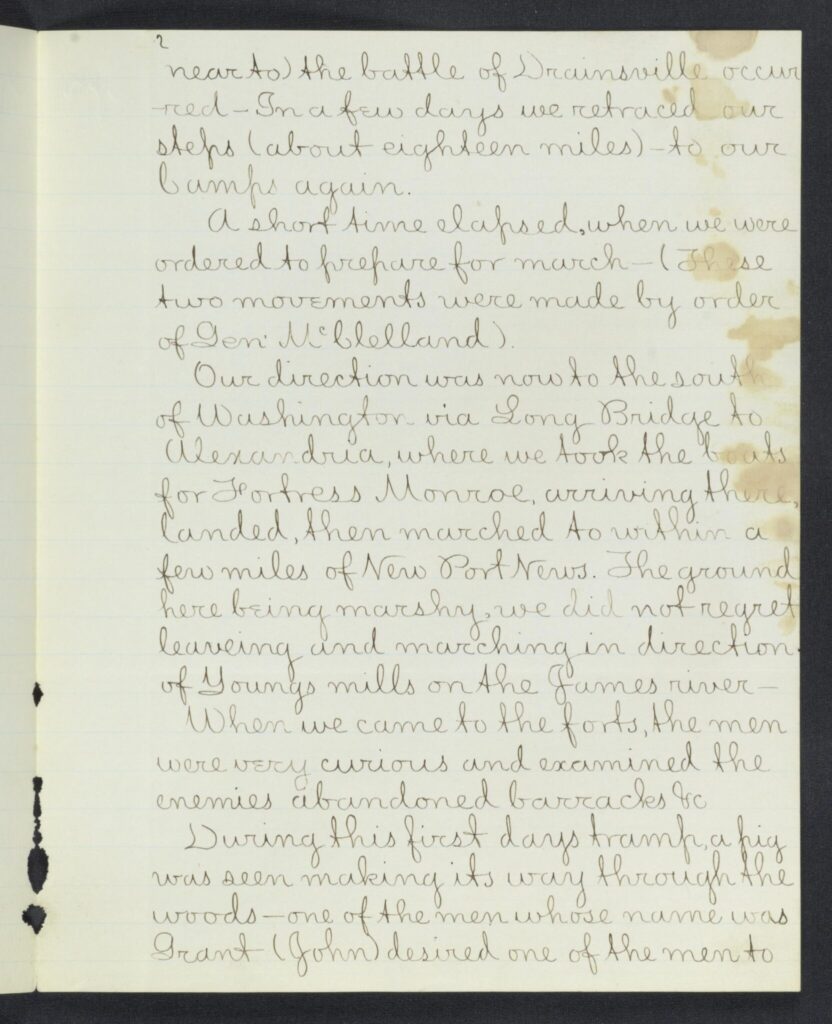
2
near to) the battle of Drainsville occurred – In a few days we retraced our steps (about eighteen miles)- to our Camps again.
A short time elapsed, when we were ordered to prepare for march – (These two movements were made by order of Gen McClelland).
Our direction was now to the south of Washington – via Long Bridge to Alexandria, where we took the boats for Fortress Monroe, arriving there, landed, then marched to within a few miles of New Port News. The ground here being marshy we did not regret leaveing and marching in the direction of Youngs mills on the James river-
When we came to the forts, the men were very curious and examined the enemies abandoned barracks etc.
During this first days tramp a pig was seen making its way through the woods – one of the men whose name was Grant (John) desired one of the men to
![carry his knapsack while he went after the animal, the request was complied with - Grant with another young man, (both belonging to Co F, our company) named Lee (not Robert) were soon in pursuit. The pig run parallel with the regiment.
Soon a report was heard. A few
minutes later the two men are seen bringing a fine black one (pig). A rail was obtained and then it was borne about the centre of the company. Fresh [*beef*]
being in demand, many eyes glistened when they glanced at that animal.
As the evening shades gathered, we halted. The pig soon received due attention - Pork stakes, coffee and bread - very good.
The next morning early again on our way. In passing Warwick Court House, the men helped themselves to deeds etc. and some of them declared that they would back when the war closed](https://tkdalton.commons.gc.cuny.edu/wp-content/blogs.dir/11105/files/2023/11/1.95-Durrah-lhp03-2.jpg)
3
carry his knapsack while he went after the animal, the request was complied with – Grant with another young man, (both belonging to Co F, our company) named Lee (not Robert) were soon in pursuit. The pig run parallel with the regiment. Soon a report was heard. A few minutes later the two men are seen bringing a fine black one (pig). A rail was obtained and then it was borne about the centre of the company. Fresh [*beef*] being in demand, many eyes glistened when they glanced at that animal.
As the evening shades gathered, we halted. The pig soon received due attention – Pork stakes, coffee and bread – very good.
The next morning early again on our way. In passing Warwick Court House, the men helped themselves to deeds etc. and some of them declared that they would back when the war closed
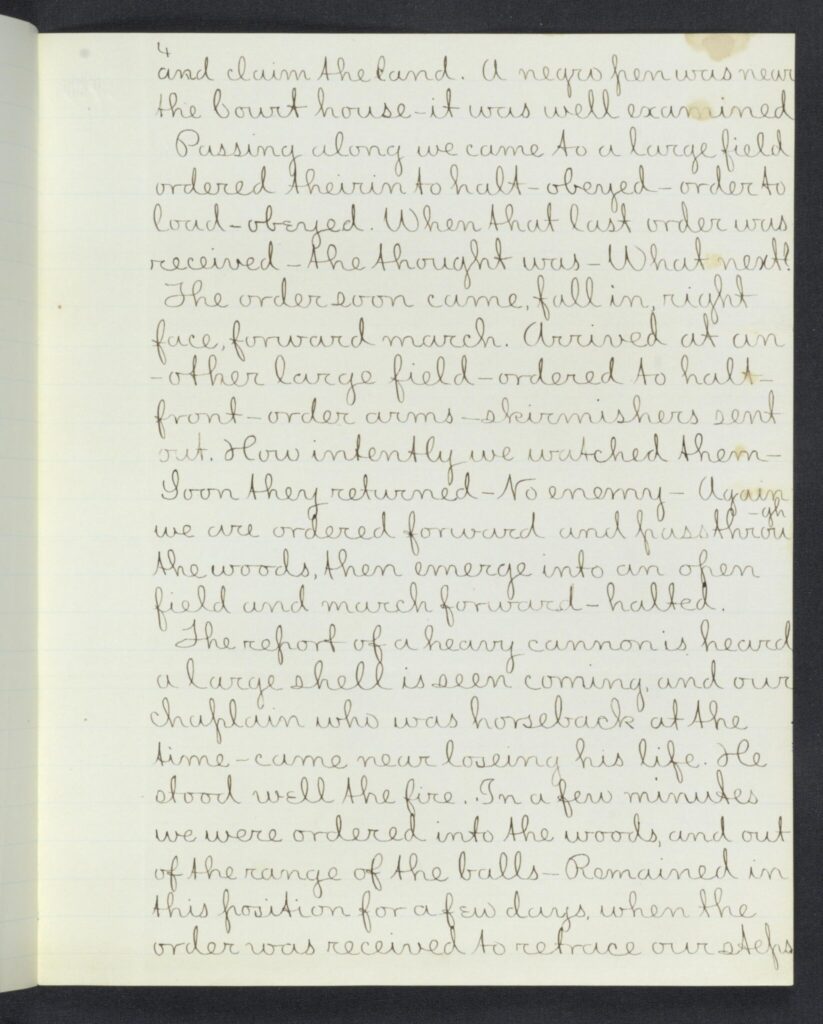
4
and claim the land. A negro pen was near the Court House – it was well examined Passing along we came to a large field ordered theirin to halt – obeyed – order to load – obeyed. When that last order was received – the thought was – What next? The order soon came, fall in right face, forward march. Arrived at another large field – ordered to halt – front – order arms – skirmishers sent out. How intently we watched them – Soon they returned – No enemy – Again we are ordered forward and pass through the woods, then emerge into an open field and march forward – halted.
The report of a heavy cannon is heard a large shell is seen coming, and our chaplain who was horseback at the time – came near losing his life. He stood well the fire. In a few minutes we were ordered into the woods, and out of the range of the balls – Remained in this position for a few days, when the order was received to retrace our steps
![[5]
toward Warwick Court House - Camped
here for about a month. During which
time corderoy roads were laid for the passage of the siege guns, teams etc.
It was a bright sunday morning when we were ordered to prepare to march - then forward - . Soon at Lees Mills, where the Vermont Troops a short time previous were repulsed. As we passed along one poor fellow was laying by the side of the road, having received a serious wound from the effects of an exploded torpedo, one out of many which were secreted in the road - Soon we were within the fort - facing the mill - Remained here about an hour, and during that time the men busily examined the barracks
Again we are ordered to fall in, and off we go. On account of having left out knapsacks at camp, the marching was easily accomplished.](https://tkdalton.commons.gc.cuny.edu/wp-content/blogs.dir/11105/files/2023/11/1.95-Durrah-lhp05-2-829x1024.jpg)
[5]
toward Warwick Court House – Camped here for about a month. During which time corderoy roads were laid for the passage of the siege guns, teams etc.
It was a bright sunday morning when we were ordered to prepare to march – then forward – . Soon at Lees Mills, where the Vermont Troops a short time previous were repulsed. As we passed along one poor fellow was laying by the side of the road, having received a serious wound from the effects of an exploded torpedo, one out of many which were secreted in the road – Soon we were within the fort – facing the mill – Remained here about an hour, and during that time the men busily examined the barracks
Again we are ordered to fall in, and off we go. On account of having left out knapsacks at camp, the marching was easily accomplished.
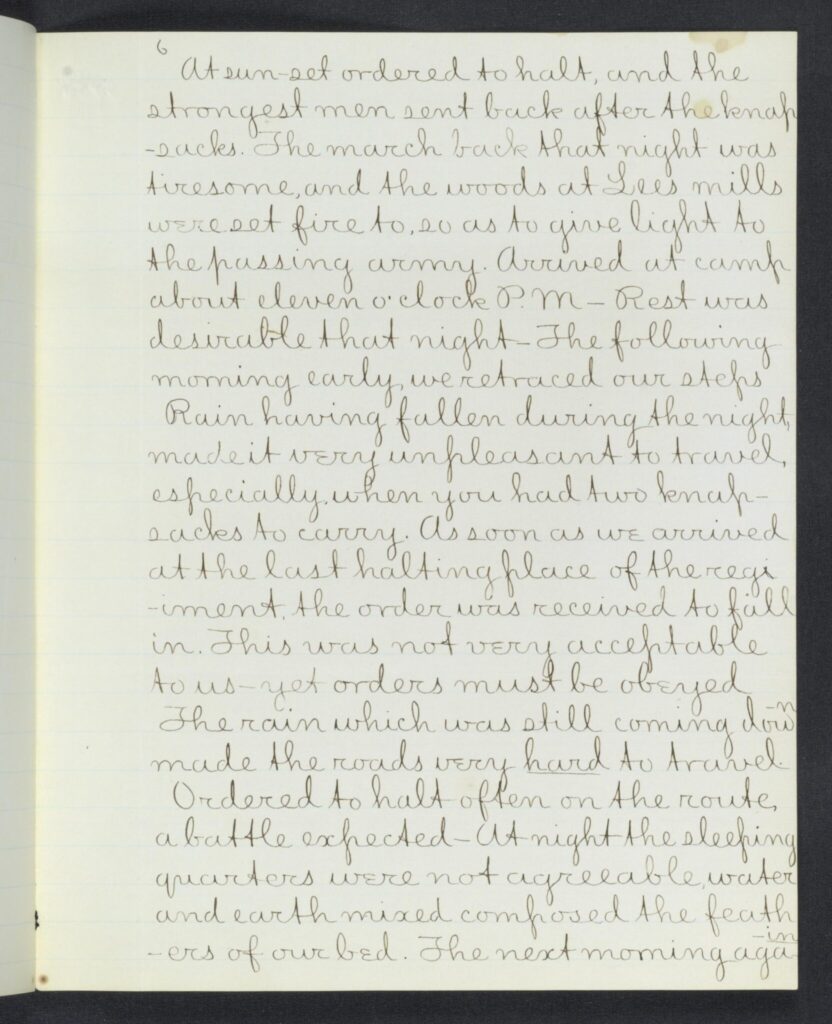
6
At sun-set ordered to halt and the strongest men sent back after the knap-sacks. The march back that night was tiresome, and the woods at Lees mills were set fire to, so as to give light to the passing army. Arrived at camp about eleven o’clock P.M. – Rest was desirable that night -The following morning early, we retraced our steps
Rain having fallen during the night, made it very unpleasant to travel, especially when you had two knap-sacks to carry. As soon as we arrived at the last halting place of the regiment the order was received to fall in. This was not very acceptable to us – yet orders must be obeyed The rain which was still coming down made the roads very hard to travel.
Ordered to halt often on the route, a battle expected – At night the sleeping quarters were not agreeable, water and earth mixed composed the feathers of our bed. The next morning again
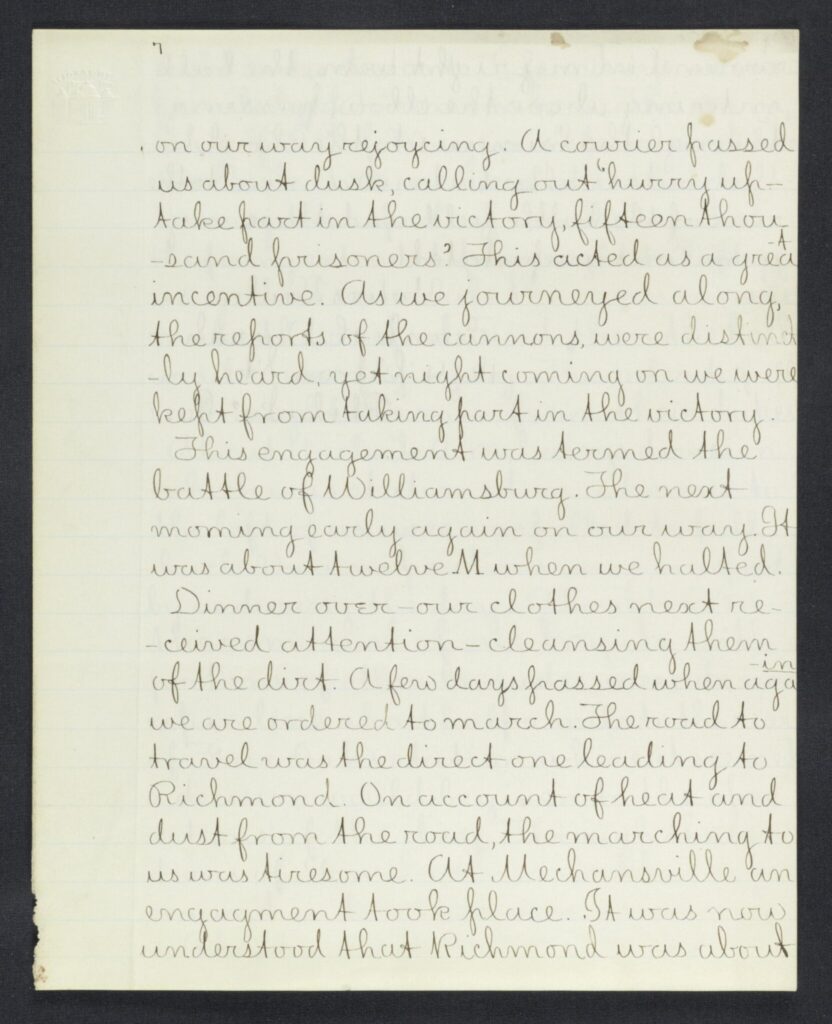
[7]
on our way rejoicing. A courier passed us about dusk, calling out “hurry up – take part in the victory, fifteen thou-sand prisoners? This acted as a great incentive. As we journeyed along, the reports of the cannons were distinctly heard, yet night coming on we were kept from taking part in the victory.
This engagement was termed the battle of Williamsburg. The next morning early again on our way. It was about twelve M when we halted.
Dinner over – our clothes next received attention – cleansing them of the dirt. A few days passed when again we were ordered to march. The road to travel was the direct one leading to Richmond. On account of heat and dust from the road, the marching to us was tiresome. At Mechansville an engagement took place. It was now understood that Richmond was about
![eight miles distant. A few days we were priviledged to remain here. The morning of 31st of May was clear and [*about*] 9 o'clock A.M. we were started by hearing the reports of musketry. Soon the firing extended from right to left of us, and at intervals the cannons would make their reports, and then the balls would come flying by. The order to fall in brought the men from their duties](https://tkdalton.commons.gc.cuny.edu/wp-content/blogs.dir/11105/files/2023/11/1.95-Durrah-lhp09-out-of-order-w-08-1-2-824x1024.jpg)
8
eight miles distant. A few days we were priviledged to remain here. The morning of 31st of May was clear and [*about*] 9 o’clock A.M. we were started by hearing the reports of musketry. Soon the firing extended from right to left of us, and at intervals the cannons would make their reports, and then the balls would come flying by. The order to fall in brought the men from their duties
About 11 o’clock A.M. Caseys division which was stationed in the advance to the left of us, were compelled to fall back. Various positions were occupied by us during the day. About 4 P.M. the remnant of our brigade, with portions of other brigades, were drawn up in line about half a mile to the rear of Fair Oaks station, where it seemed a decision would be given to the operations of the day. Through exertions of Gen. Sumner and his command a decision was given.
About 5 o’clock P.M. I received a
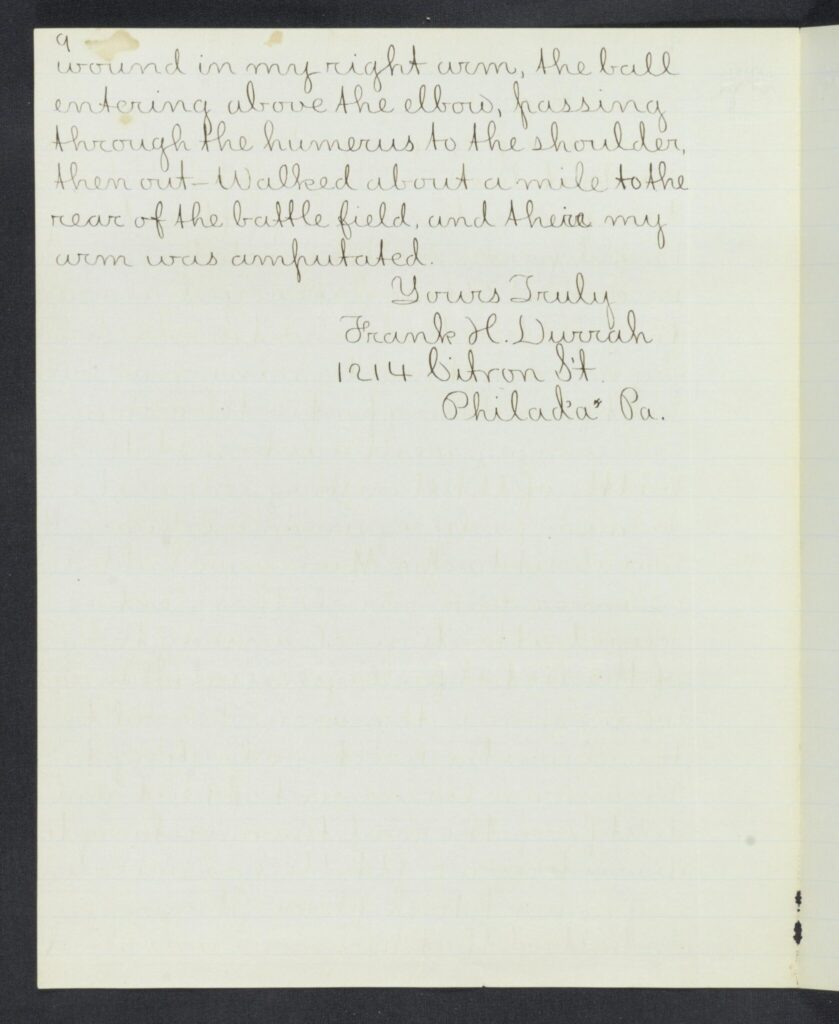
9
wound in my right arm, the ball entering above the elbow, passing through the humerus to the shoulder, then out-Walked about a mile to the rear of the battle field and their my arm was amputated.
Your Truly
Frank H. Durrch
1214 Citron St.
Philada” Pa.
Durrah’s text can be analyzed using digital reading tools.
“Readability Index:” 8.635
Word count: 1,256
Keywords: ordered (10) or order (8); soon (9); men (8), received (7)
Though word repetition isn’t always so indicative of a writer’s concerns, here it reveals a sense of being batted about, told where to go and what to do, that lasted for this soldier. The other useful piece of information from a digital read of this text is sentence length. Though not something this project always addresses, and though something that Durrah’s prose complicates, 19.0 is long.
Time elapsed figures and ratios


